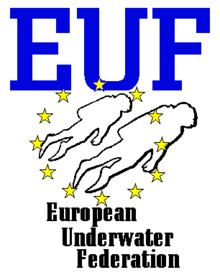European Underwater Federation
 | |
| Abbreviation | EUF |
|---|---|
| Formation | 1989 |
| Type | INGO |
| Legal status | Company Limited by Guarantee (incorporated in the UK) |
Region served | Europe |
Membership | Scuba training organisations |
Official language | English |
President | Wolfgang Mehl (FIAS) (term 2012-15)[1] |
Main organ | Executive Board |
| Website | http://www.euf.eu/ |
The European Underwater Federation (EUF) is an umbrella organisation representing the interests of SCUBA diver training organisations operating in both the not for profit and for profit sectors within Europe.
Purpose and scope
EUF seeks to be the peak consultative body within Europe in respect to all matters that concern recreational diving activities, particularly those concerning legislation, regulation and safety. By virtue of the knowledge and experience of its corporate members, it claims an area of competency within recreational, cultural and sporting underwater activities in matters such as the conduct of diving activities (including competitive activities), access to diving sites, training, all aspects of diving equipment, treatment of diving injuries, teaching and the use of recreational diving techniques by professional persons. It claims no expertise in areas involving commercial or military diving.[2][3]
Members
The EUF has a membership consisting of a broad range of European training organisations, including for-profit and non-profit making bodies. It is incorporated in the UK as a Company Limited by Guarantee. The EUF estimates that its members represent over 3,000,000 divers, 60,000 diving instructors, 5,000 clubs and 2,500 diving schools.[2][4]
Individual training organisations may apply for full voting membership of the EUF either as profit distributing organisations and non-profit distributing organisations. Organisations that cannot meet the definition of a training organisation can either apply for Associate Membership or Observer status. Two special members also exist: CMAS Europe, which represents the interests of national diving federations located in Europe and who are affiliated to Confédération Mondiale des Activités Subaquatiques[5] and RSTC Europe, which represents the interests of for-profit scuba training organisations operating in Europe.[6] The membership consisted of the following organisations as of October 2012.[7][8][9][10][11]
Profit distributing
Special members |
Non-profit distributing
|
Associates/observers
|
History
The EUF first became active in its modern form in 1989, initially comprising a number of non profit distributing European diver federations, then subsequently expanding to include the major profit distributing training agencies.[14]
The EUF and international standards
The EUF states that it actively supports the development of both European Norms (via CEN, the European Committee for Standardization) and International Organization for Standardization (ISO) standards for recreational scuba diving.[15]
EUF Certification Body
In 2003, the EUF Certification Body was formed, a joint-venture between the EUF and the Austrian Standards Institute (ON). The EUF Certification Body, (which is also known as EUF Certification International) exists to offer the recreational scuba diving community a unified procedure of reliable and recognised proof of the quality of scuba diving training services based on European and ISO standards. It audits diver training organisations and service providers and, where appropriate, certifies them as complying with the relevant standards.[14]
As of January 2016, the following recreational scuba diving training organisations have been certified by EUF Certification International since the year 2004:[16]
|
|
See also
References
- ↑ "News". EUF. Retrieved 18 December 2012.
- 1 2 "The Aims of the European Underwater Federation". EUF. Retrieved 27 January 2013.
- ↑ "The Areas of Competence for EUF". EUF. Retrieved 27 January 2013.
- ↑ http://www.euf.eu/ Retrieved on 2008-09-02
- ↑ "CMAS Europe Articles of Association, 25 June 2005" (PDF). Retrieved 5 November 2012.
- ↑ "Imprint: RSTC – Europe Information:". RSTC-Europe. Retrieved 4 November 2012.
- ↑ "Rules and By-laws" (PDF). European Underwater Federation. Retrieved 20 October 2012.
- ↑ "Profit Distributing Members". European Underwater Federation. Retrieved 20 October 2012.
- ↑ "Non-profit distributing members". European Underwater Federation. Retrieved 20 October 2012.
- ↑ "Special Members". European Underwater Federation. Retrieved 20 October 2012.
- ↑ "Associates/observers". European Underwater Federation. Retrieved 20 October 2012.
- 1 2 "Associate/Observers". European Underwater Federation. Retrieved 16 December 2012.
- ↑ "Aida accepted as associate member of EUF". International Association for the Development of Apnea. Retrieved 16 December 2012.
- 1 2 http://www.euf-certification.org/ Retrieved on 2008-09-02
- ↑ "Standards". European Underwater Federation. Retrieved 21 October 2012.
- ↑ "EUF Certified Training Systems/Training Organisations". EUF Certification International. 12 January 2016. Retrieved 12 May 2016.
External links
- EUF website
- EUF Certification Body website
- CMAS Europe
- RSTC Europe
- Austrian Standards Institute (ON)
.jpg)